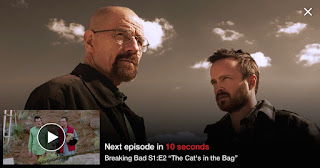Next episode in 10
seconds - Default Effect contributes to Binge Watching Netflix
Binge
watching is watching 2-6 episodes of a show in one sitting (Spangler, 2013).
There are many reasons to binge watch for instance the more thrilling the show,
the longer it’s watched (Pittman & Sheehan, 2015).
Personally
I binge watch Netflix while eating. The ending of an episode serves as an
external cue for my meal cessation as it did for 145 Americans in a research, where an
empty plate or the end of a show marked the end of their meals (Wansink, 2010).
However other external cues may be at play as well.
I observed that when an episode
ends, it automatically plays another episode in the next 10 seconds until and
unless you actively chose not to. It seems very similar to the default effect
where the default option will be automatically opted for in the case of no
active choosing (Thaler & Sunstein, 2008). People tend to stick to the
default due to the powerful effect of inertia where inaction is preferred over
action (Korobkin, 1998). Therefore in my opinion, the default option of the
next episode playing automatically may be a contributing external factor to
binge watching especially for the lazy procrastinators that we all are!
References
Korobkin,
R. (1998). Inertia and preference in contract negotiation: The psychological power
of default rules and form terms. Vand. L. Rev., 51,
1583.
Pittman,
M., & Sheehan, K. (2015). Sprinting a media marathon: Uses and
gratifications of binge-watching television through netflix. First Monday,
20(10).
Spangler,
T. (2013). Netflix survey: binge-watching is not weird or unusual. Retrieved
from http://variety.com/2013/digital/news/netflix-survey-binge-watching-is-not-weird-or-unusual1200952292/
Thaler Richard, H., & Sunstein Cass, R.
(2008). Nudge: Improving decisions about health, wealth, and happiness.
Wansink,
B. (2010). From mindless eating to mindlessly eating better. Physiology
& behavior, 100(5), 454-463.


No comments:
Post a Comment
Note: Only a member of this blog may post a comment.